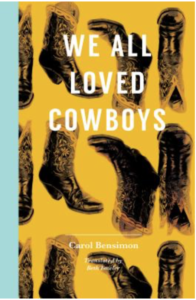“ALL WE DID was take the BR–116.” So begins Carol Bensimon’s We All Loved Cowboys, a beguiling road trip novel that lures readers in with promises of adventures in Brazil, then keeps them turning the pages with its sharp observations about gender, sex, and desire. It helps to have some context: the BR-116 is a federal highway, the second longest in Brazil, and the “we” of the first sentence refers to the narrator Cora and her friend Julia, with whom she had a major falling out several years prior to the road trip.
Bensimon wisely withholds the exact nature of this falling out until partway through the road trip, allowing the tension to simmer between the characters as she diverts the reader’s attention with tales of Cora’s time studying fashion in Paris, descriptions of Brazil’s beautiful landscape, and revelations about Julia’s boyfriend in Montreal, who refused to join her on the trip, even knowing how important it was to her. At times, the diversions can feel as if they’re meandering in no particular direction, but as the road trip progresses and all the various narrative threads weave together, it becomes clear that this is a deliberate stylistic choice, not a failure of craft.

Bensimon, who was named one of the twenty Best Young Brazilian Novelists by UK literary magazine Granta in 2012 (one year before We All Loved Cowboys was published in the original Portuguese), knows exactly where she wants this road trip to lead, even if it isn’t always clear to the reader—or to the main characters themselves. Early in the third chapter, Cora reminisces about planning the road trip and realizes that, for all her dream-weaving, she had no clear idea of what this trip would entail. She explains: “The thing was that our idea always had the appearance of a long line stretching between nothing and nothing.”
And yet, between the nothings is everything: the initial discomfort of being reunited, the awkward early attempts at reconciliation, the jealous hostilities surrounding Julia’s phone conversations with her boyfriend in Canada, and the first tentative bits of flirtation before passion finally ignites between the main characters. In other words, “between nothing and nothing” there is love: the messy, complicated love of two women who keep finding their way back to each other despite their grievances, despite Julia’s tendency to deny that there’s anything between her and Cora, and despite the added complications of their families, who don’t understand the relationship between the two women.
One of the unfortunate realities of LGBT relationships in Brazil, as in the U.S., is that they often go unacknowledged by family members who insist on referring to LGBT partners as “friends.” This is what Cora’s mother does when talking about the two women. When Julia and Cora confront Julia’s brother Mathias about a family secret, he tries to change the subject, saying, “Don’t you think this is kind of something for family only?” Julia retorts that Cora is family, and that is the single clearest way that Julia expresses love: by inviting Cora in, allowing her to see the messiness, the secrets, and the deceit. This invitation strengthens their relationship, as does Cora’s willingness to miss the birth of her half-brother in order to take this trip with Julia.
Whether or not the women are willing to admit it at the beginning of the journey, their love is undeniably life-changing. Though the author leaves the fate of her two main characters open-ended, one gets the sense that Cora and Julia have a long, winding road ahead of them—one full of pit stops, false starts, and some hard conversations with their families. Readers will not be disappointed by what they see of this journey, but they may be left wanting more.
_________________________________________________
Ruth Joffre is a writer based in Seattle.







